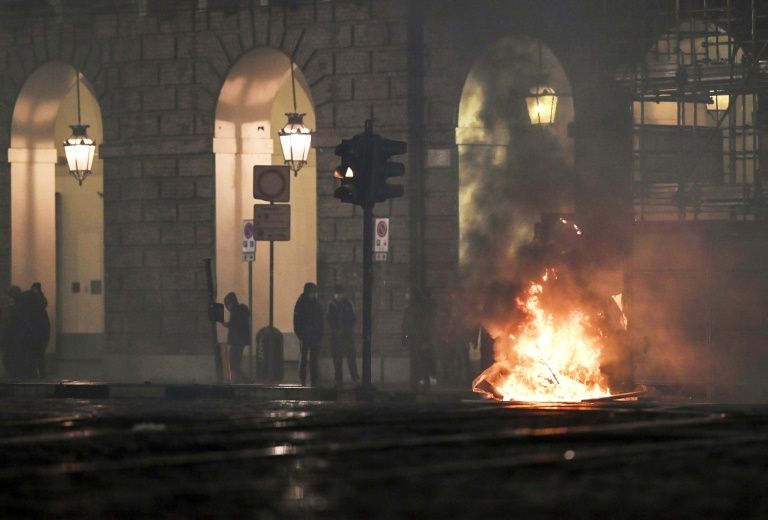Protesters clash with Italian police over anti-Covid measures
Rome (AFP) – Thousands of Italian protesters angry over new restrictions announced to control the spread of coronavirus clashed with police in cities on Monday as European governments toughened their responses to the contagion.
Following weekend demonstrations that saw violence in Italy, crowds ranging in size from several hundred to several thousand took to the streets again on Monday evening.
In Milan, several trams were vandalised and bins were set on fire, while anti-riot police fired teargas at groups of young people throwing glass bottles and other projectiles, with similar scenes found in neighbouring Turin and in southern Naples.
The scenes of unrest came after Italian Prime Minister Giuseppe Conte ordered restaurants and bars to shut from 6:00 pm, while theatres, cinemas and gyms were ordered closed for a month — much to the annoyance of business owners, opposition politicians and even some scientists.
The violence in Italy, which imposed one of the toughest lockdowns in the first wave of infections in March and April, is likely to reverberate around Europe where governments are weighing the need for tougher measures against the fatigue and frustration felt by many.
“There’s no question that the European region is an epicentre for disease right now,” WHO emergencies chief Michael Ryan said on Monday.
Maria Van Kerkhove, the WHO’s technical expert on the pandemic, also voiced concern about the situation in Europe — and in particular a surge in hospitalisations and rapidly filling intensive care units.
“In many cities we’re seeing beds filling up too quickly, and we’re seeing many projections saying the ICU beds will reach capacity in the coming days and weeks,” she told Monday’s briefing.
The Czech Republic said it would impose a a night-time curfew, mimicking measures already introduced in France and Spain, Slovenia imposed border closures, while even Norway, with one of Europe’s lowest infection rates, tightened its rules on social gatherings on Monday.
France is also bracing for harsher measures with President Emmanuel Macron set to gather his top ministers Tuesday to review efforts to curtail the outbreak after the number of daily cases topped 50,000 for the first time at the weekend.
Some options reportedly being considered included weekend lockdowns in high-infection areas, an earlier night-time curfew, or even another general country-wide stay-at-home order.
Covid-19 has now claimed the lives of 1.1 million people and infected more than 43 million globally.
– ‘Rounding the corner’ –
The economic fallout continues to be severe, with tens of millions losing jobs and economies tanking across the world and politicians struggling to find answers.
US President Donald Trump, with his reelection campaign in full swing, was once again on the backfoot after one of his senior officials suggested his government would not control the virus — comments seized on by challenger Joe Biden.
“We’re absolutely rounding the corner,” said Trump, denying he was giving up on the virus fight even as his country smashed its own dismal record for new daily cases on the weekend.
The World Health Organization chief Tedros Adhanom Ghebreyesus warned “giving up on control” of the pandemic was “dangerous”.
Wall Street had its worst session in weeks on Monday, driven by spiking virus cases globally that could mean new business-strangling containment measures, as well as the worsening prospects of new stimulus for the US economy.
Despite months of arduous talks, there appears to be little chance Republicans and Democrats will hammer out a rescue deal to help cash-strapped Americans before the November 3 election, with both sides blaming the other for the impasse.
– ‘Jeopardising’ cinema –
In Italy, Prime Minister Conte told citizens on Monday that he hoped the new restrictions “will allow us to be more relaxed by Christmas”, but warned “hugging and partying” would remain out of the question.
The newspapers poked fun at the prime minister, with Corriere della Sera’s front page featuring a cartoon Conte telling Father Christmas: “Stop! We’ve brought in a decree to save you!”
But restaurant and bar owners were not laughing. The early closing times mean Italy’s bustling aperitivo hour is gone, as are dinners out.
And Italy’s foremost film directors wrote an open letter warning that by closing cinemas the measures risked “jeopardising the future of an entire sector”, and Italian conductor Riccardo Muti said the move would harm people’s health.
Far-right opposition leader Matteo Salvini said he was preparing a legal challenge, but the WHO’s adviser to Rome Walter Ricciardi said the new rules may “not be enough” to stop the virus.
The street violence in Italy was mirrored in Nigeria where crowds ransacked warehouses in the capital Abuja, where they carted off supplies earmarked for distribution during the coronavirus lockdowns.
“We are hungry, you understand,” a man with a package of noodles in his hand told AFP. “We are not stealing, it’s our food and our right.”
Australia provided a small dose of good news on Monday, with the second city of Melbourne registering no daily cases and preparing to exit one of the world’s most severe lockdowns.
The city’s residents have been under stay-at-home orders for nearly four months but with new cases falling dramatically, the state’s politicians had been under pressure to lift the measures.
jxb-adp-burs/jm
Disclaimer: Validity of the above story is for 7 Days from original date of publishing. Source: AFP.


